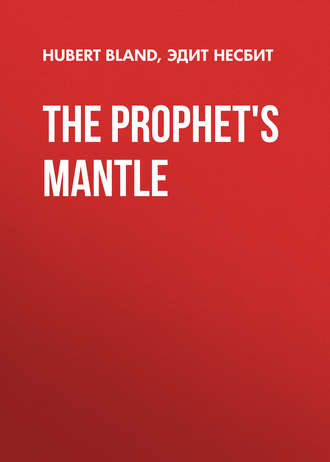
Эдит Несбит
The Prophet's Mantle
CHAPTER XX.
IMPROVING PROSPECTS
CLARE STANLEY was the mistress of Aspinshaw, and of a good deal of bricks and mortar, stocks and shares, and Three per Cent. Consols besides. Mrs Stanley was comfortably provided for, but it was Clare who was to profit by the hard work, the self-denial and forethought of some three generations of Stanleys, or, as some might think, of their greed, their grasping, and their over-reaching of their less crafty fellow-men.
The will that had laid the burden of wealth upon her, at an age when most young women of her class are engaged in constant differences with their parents and guardians on the subject of pin-money, had been the one act of eccentricity of Mr Stanley's whole life.
For some days her grief for her father's loss had been too absorbing to permit of her thinking of much else besides, but on this first day of the new year she felt more able to think, and as she sat alone by the drawing-room fire she began for the first time to realise her position. About one thing she had made up her mind; she must leave this horrible house, where the shadow had fallen on her which she felt just then could never be lifted again.
Between Clare and her father's second wife there had always been perfectly cordial relations, but they were not bound together by any ties of love.
Mrs Stanley had always done her duty to her husband and his child, but hers was a cold nature, and not one which had drawn out Clare's heart towards itself. She was now going to stay with her own relatives, and was perfectly willing to take her step-daughter with her; but the girl decided, without much need for reflection, that there would be many things better than to be buried alive in a Yorkshire village, with no one more congenial to talk to than Mrs Stanley or Mrs Stanley's relations, whom Clare had been wont to term 'the fossils.'
An unposted letter lay on the little table at her elbow, in which she had accepted an invitation to spend an indefinite time with the Quaids. She thought that in London, away from the associations of the recent past, she would be better able to plan out the course of her future life. She knew that that course would now be a very different one from what it would have been had she had the planning of it three months ago, before she met Count Litvinoff or spent that evening at the Cleon. She was sorrowfully glad that her father's will was what it was, for she was conscious in a vague sort of way that wealth meant power, and she was determined that in her hands it should mean power to do good and to make others happy. Her plans went no further than this at present, and she knew that even to carry this out she would need teaching and help and counsel from those who had more experience of the world and its needs than she had. It was, perhaps, this thought that had mainly influenced her in her acceptance of Mrs Quaid's very kind and cordial invitation, for Marlborough Villa was not the most unlikely place in the world at which to meet some one who had just that which she lacked. There she had first been forced to think; perhaps there she would first be taught how to act.
Why does one never learn at school the things one needs when one leaves it? 'How much there is to know—how much there is for me to learn,' she said to herself, with a little sigh, leaning forward and gazing into the glowing fire, resting her elbow on her knee and her cheek on her clasped hands.
She started and rose at a loud, clanging ring of the door-bell. As she had expected, the servant announced 'Count Litvinoff.' He came forward with a low and deferential bow.
'You must forgive me,' he said, 'for calling on you on Sunday afternoon, which, I believe, is not the rule in England; but I heard that you were leaving Aspinshaw to-morrow, and I could not run the risk of not seeing you again.'
'We are always pleased to see you,' said Clare; 'but I am not going to London for some time yet. There will be a good deal of law business, I suppose, and it is not fair to carry the trouble of that to my friend's house. Is Mr Roland well?'
'He is on duty,' said Litvinoff; 'he has gone to a chapel with his aunt, which is good of him, as his views are not that way.'
Clare drew a breath of relief. She had not felt comfortable in Roland's presence since that interview with Litvinoff in the National Gallery.
'I myself shall be returning to London in a few weeks,' the young man went on. 'I have already stayed as long as I at first intended to do, but now Ferrier is good enough to wish me to stay until the household at Thornsett Edge is broken up.'
'Ah, yes, I had forgotten that. What a horrible thing! What are they going to do?'
'I believe Mr Roland will live with his aunt at Chelsea.'
'We seem to be all going to London,' said Clare, with an effort to be as cheerful as possible.
'True; but London is so vast, and in it I know so few people whom you are likely to know, that I feel I might as well be going back to Siberia for any chance I shall have of seeing you.' This with the air of one who would as soon go to Siberia as not while he was about it.
'Oh, I daresay we shall see each other,' she answered, leaning back in her chair and trifling with a big screen of peacock's feathers, which she had idly taken up. 'I'm going to stay with a lady who is madly anxious to know you.'
Count Litvinoff looked intensely surprised, as though that had been almost impossible.
'I think I told you about her,' she continued; 'Mrs Quaid, who belongs to the Cleon, you know, where I heard all about Socialism, you remember?'
'Oh, yes, I remember,' said Litvinoff, which was true. He did.
'I do hope I shall see you again, because you and Mr Petrovitch are the only two people I know who can help me.'
'It is a great privilege my fellow-countryman shares with me, Miss Stanley. May I be the first to hear of what help you stand in need?'
'I daresay you have heard,' she answered, 'that my father'—here her voice trembled a little—'has left me nearly all his money, and it is mine now, though I am not of age.'
Ah, no, Count Litvinoff had certainly not heard that.
'And then, you see,' she went on, knitting her brows under the stress of the difficulty she found in putting her thoughts into words, 'the question is, what am I to do with it? A little time ago I should have found it easy enough to do with it what every one else does; but I have been thinking a great deal—a very great deal lately—ever since I heard Mr Petrovitch; and now I feel the responsibility of it so much more than I should have done before.'
Count Litvinoff thought to himself that that was the sort of responsibility he was admirably adapted to share. He merely looked sympathetic, and Miss Stanley went on.
'And then I feel sure money may be a fearful curse if one doesn't use it properly. Of course, I can't disguise from myself that this money was made in the usual way, and that others have lost all that my father and his father have gained, and I wish I could think of some way in which it might give as much happiness as it would have done had it been left in the hands of the workers who toiled to produce it. You are one who should be able to advise me. What shall I do?'
Litvinoff's hair almost stood on end. This was getting his own coin back with a vengeance.
'My dear Miss Stanley,' he said gravely, 'if I were to advise you in the only way which seems possible to me now, your friends would all look upon me as your worst enemy—as an adventurer, as a rogue. Whereas I desire to be looked on as your faithful friend and servant—as the man who, more than all others, would go through fire and water to do you the slightest service.'
'I should hardly have thought you would have cared what my friends or anybody else thought of you,' was Miss Stanley's only reply to this fervid declaration.
'Under most circumstances,' said the Count, with a little wave of his hand, 'I do care for nothing and for nobody; but'—he went on, with a slight tremor in his voice—'rather than incur the dislike of any one whom you respect and love, I would abjure every principle, and sacrifice every cause.'
'I asked for advice,' said Clare, not seeing her way to a more direct answer.
'I know you did,' he spoke rapidly, dropping into a foreign accent; 'and I—I cannot give it you, Miss Stanley. Let me tell you one thing. You know—you have heard, you have read—how in Russia, when money is wanted for our cause, it is the duty of some of us to get it—to persuade it out of those who have. That has often been my duty, and I have never failed. I have taken, over and over again, all, all from those as young as you, and have left them with nothing. I have had to raise enthusiasm by every means, to urge to self-sacrifice, and then to take unsparingly. There are men now, my friends, who, if they knew that you—rich, young, enthusiastic—had asked me for advice, and that I had refused to give it, would say, "Michael Litvinoff has become traitor," and would kill me like a rat. But,' he went on, rising and stretching out his clenched fist, 'did I know that a legion of such men were outside that door, armed and waiting for me, and hearing every word I speak, I would still say that for no cause in the world must you make sacrifices or must you suffer; and I would still say that I would serve you before all causes.'
'Count Litvinoff, I can hear no more of this. Please talk of something else.'
'Ah! now yet once more I have offended you. It is part of my unhappy lot that whenever I speak in earnest I offend you. But I can't talk of something else to-day. I must say adieu, Miss Stanley. If I stayed I should disobey you, and I cannot disobey you.'
'Good-bye, then,' said Clare, extending her hand.
He caught her hand, held it tightly an instant, bent over it as though he were about to raise it to his lips, then dropped it as if it had burned him. 'Adieu,' he said, 'I know that in England the hand-shake means forgivenness, and that once more I am forgiven—for speaking the truth—and that I may see you again.'
Clare did not gainsay it, and he left the room.
Count Litvinoff was marching back to Thornsett with a very elate step, and a good deal of military swagger, and Clare had resumed her thinking—she was thinking of him, and he was thinking of her. He thought aloud, as usual.
'H'm,' he said to the grey stone walls on each side of him, and to the plovers who were wheeling and screaming overhead, 'la belle was offended, but not so much. When she thinks over it she will say,—"He is not a good patriot and friend of liberty, this Litvinoff, for he forgets his mistress, La Révolution; therefore he is unfaithful." Ay, but she will add, "He only forgets her when I am near, and he is only unfaithful for me," C'est bien—c'est bien—c'est très bien!' he added, vaulting a gate and making a short cut home.
CHAPTER XXI.
FRIENDS IN COUNCIL
GOING out again, John?' spoke Mrs Hatfield, a little plaintively, as her husband rose and took down his hat from its peg, ten days after Thornsett Mill had been closed. Not closed for a day on account of a wedding, as had once been suggested, but closed, it might be for ten years, or practically for ever.
'Ay, lass,' said her husband shortly, but not unkindly; 'Ah should go clean daft if Ah stayed i' the house. Lazying about don't suit me—it's only my betters as takes their pleasure i' that way.'
'Tha'lt do no good down at t' Spotted Cow,' returned Mrs Hatfield, compressing her lips; 'tha might as well be idle i' tha own house as wi' all they gomerils—spending tha money too, as if tha was i' full work.'
'Well,' he said, pausing with his hand on the back of the settle where she sat, 'we'll all have to be shifting out o' this soon, and tha knows, lass, as Ah were never one to drink nor to talk out o' season. Ah mun hear where the lads is going for work. It won't ne'er do for us a' to be going the same way.'
'It seems hard tha should have to go after work at tha time o' life, John. But likely it's as hard for Rowley and Dick as for thee and me. Poor lads, poor lads! Ah, Heaven help us a' in this hard world.'
'They're fur enow fro' want, tha may be sure, or they wouldn't ha' sacrificed the mill to their mucky pride. It's little they care who starves, so long as they have enow. Tha must remember as what they'd call being poor we'd call being rich. "Hard up" for a gentleman ud be enow and to spare for a working man.'
And he went out, slamming the door behind him, and his wife took up her knitting with a sigh. She could rarely follow her husband in his reasonings, but troubles are not the less hard to bear because we don't clearly see their causes. They had saved a little money, but that would soon be gone, and then there would be nothing before them but 'the house.' Both their sons were away—one a sailor, and the other in a warehouse in Liverpool—but neither was earning enough to be able to help their parents. Vaguely she hoped that her husband might take it into his head to go to London for work. An idea is prevalent in the provinces that in London there is work for every one, and besides, Alice had written from London, and there would be a chance of finding her poor lost child and bringing her back.
The sudden closing of the mill made affairs indeed terribly serious for most of the men in Thornsett. It was in the middle of winter, when journeying was not pleasant, nor work easy to get; and though the 'hands' employed in the mill had been told that it would close, very, very few among them had made any effort to secure other work before the time for closing came. Perhaps it had seemed to them that the closing of the mill was one of those calamities too terrible to happen. But it had happened, and after ten days of idleness the men were beginning to see clearly what it would mean to them. For there was no other work to be got within anything like easy reach of the village; and even if work could be obtained somewhere else, the little community must be broken up, and each family must separate itself from friends and neighbours and relatives in order to journey thither. This alone is thought a terrible calamity for middle-class men and women, but it is the least of the troubles which are always hanging over the heads of the workers. The exodus that must shortly take place had not yet begun, but every one knew that it could not now be long delayed; and Potters and the few other tradespeople being, of course, involved in the general distress, could no longer give credit. This had never been withheld in slack times, when the shopkeepers knew that good ones were certain to come in which the scores would be wiped off or reduced very considerably; but now there was no chance of things growing brighter again, and even the small accounts then owing were not very likely ever to be paid.
During the past ten days, as the men's money was being spent, and as the want of work gave them more time to reason on the causes of their trouble, a strong feeling of resentment had been growing up among them against the two young masters, who had held, as it were, the happiness, the comfort, perhaps the lives, of all these men in their hands, and had thrown all to the dogs rather than humble their own insensate pride and abate their own insensate obstinacy. This feeling had found vent, not only in the scowls and black looks on which Litvinoff had commented, but in certain faint groans and hisses with which Roland had been greeted on more than one occasion when he passed down the village street.
What right had these two, on whose forbearance and good fellowship hung the fate of all these families, to go quarrelling with each other?
'It's a' their darn'd selfishness,' Murdoch was saying, just as Hatfield kicked open the door of the tap-room at the Spotted Cow, and passed in. 'What's the odds to them if we clem or if we dunna't?'
'It's my belief,' said Potters bitterly, 'as they done it to show their independence.'
'They might have hit on a cheaper way,' growled Hatfield, as Murdoch and Sigley made room for him to sit between them.
'Cheaper! why, what's cheaper nor our flesh and blood?' asked Murdoch, with a snarl. 'They can afford to chuck a little o' that away. They can get more of it when they want it easy enow.'
'Ay, that's it, lad,' said Hatfield. 'It's the flesh and blood o' some o' us that's here still, and more o' us that's dead and gone, that's made the bit o' money they'll live on for the rest o' their days.'
'Well, I don't quite see that,' muttered Sigley, with his usual meekness. 'They've always paid fair wages.'
'Yes,' answered Hatfield. 'Ah never said they took it for nothing. They paid for it right enow, but they bought it cheap, lad—they bought it cheap, and they sold it at a good profit. We've nowt but our flesh and blood to sell, and now we mun carry it to another market.'
'If you mean your work,' put in the landlord, 'I don't see as you ought to talk i' that way. They paid you your own price for your work, anyhow.'
'No,' said Hatfield. 'They paid us what we was forced to take.'
'Thou'dst always some sense i' tha head, John,' broke in old Murdoch approvingly. 'Tha was na here when.... D'ye mind, Bolt, the night after t'owd master's burying, tha made the lads drink t' young masters' health? Ask them to drink it now!'
The murmur of ironical assent which went round the room showed that Murdoch had expressed the sense of the meeting. He had been rising in importance daily, ever since the announcement of the mill's closing. He had always been the prophet of calamity, and now that his worst prophecies had been more than fulfilled he was looked upon as little less than inspired.
'Well,' said Bolt deprecatingly, 'who could ha' foreseen things turning out i' this way? And as for asking them to drink their healths, why they ain't their masters now. So where's the use?'
'It do seem hard, it do,' murmured Sigley, who went to chapel regularly, 'when a man have saved up a bit to have it all swept away in a rushing, mighty wind, and us left, like Pharaoh's lean kine, to make bricks without straw. The whole creation groaneth!…'
'Well, don't groan here,' interrupted Murdoch grimly; 'tha'd best do tha groanin' wi' the rest o' creation at t' chapel; and well mayst tha groan there if tha hears tell o' cows makin' bricks.'
'Them as don't believe in the Bible,' said Sigley impressively, giving voice to a very popular belief, 'can't look for a blessing.'
'Nor yet them as does, it seems.'
'What ah was going to say was this—as we should take comfort, thinking as we ain't the only ones.'
'Comfort, tha loon!—that's the hell of it! Damn the man, says I, as can find comfort i' t' thought o' other men's misery!'
It was Hatfield who spoke, and as he spoke he brought his fist down on the table with a bang that made the glasses ring.
'How tha does take on, John,' said Bolt. 'What Sigley meant was only as it shows you ain't to blame, seeing as so many others is in the same fix.'
Sigley did not confirm this interpretation. He only shook his head, with the air of one who had meant something much more pious and profound.
'You're wrong again,' said Hatfield loudly. He had risen and faced the room, which was now pretty full. While this talk had been going on, men had dropped in by twos and threes, and all that had been said had been listened to with profound attention. 'You're wrong again! It is our faults, and the faults of all like us. Our fathers might have altered it. We might alter it now if we had but the spunk to take it in hand; and, if we don't, them as comes after us will, and'll curse us for leaving them the work to do. Didn't none o' ye ever hear tell o' the elephant that lets himself be led and mastered by one he could smash with a shake o' his poll? And why? Because, the books tell us, he doesna know his own strength. But he doesna fare so bad as we. He gets well fed and well looked after because it costs summat to replace him, and we lets oursels be led and drove and starved, when it suits 'em, by a set as we could chase out o' the world to-morrow if we but stood together and acted like men.'
A thrill of excited sympathy ran through the room as old Murdoch shouted,—
'Right again! That's it, John; tha's got it! A score thousand o' your pattern and there'd be an end to men being turned out o' their homes to clem i' midwinter because two young devils both wants the same lass!'
'It's all very well, Hatfield,' said Potters sourly; 'but tha's one face for us and another face for t' gentlefolk. That warn't no working man as I've see comin' out o' your house time and again this last three week.'
'No, he ain't. He's more o' the right stuff in his little finger nor you and all like you put together has got in your whole bodies. There, take that, Potters!'
'Whatever he's got in him, he seems pretty thick with young Roland Ferrier,' said a man who had not spoken before.
'He did his best to stop their quarrelling,' Hatfield answered hotly; 'because he knew what it would be for all o' us; and he's been chased out o' his own country and lost nearly all his brass for standing up for the likes o' we.'
'Yes, I've had a bit o' talk with him, too; that's true enough.'
'Ay! he's no fool, nor no coward neither.'
'He's a true friend o' working men, he is, if he is a Count.'
Litvinoff, it will be seen, had not lost his opportunities while he had been at Thornsett, for nearly every man present had something to say in his favour.
'But seeing as he's such a friend o' Mr Roland's, why don't he do something to stop this set-out?'
'What can he do?'
'He might speak to him about it.'
'Look'ee here, lads,' said Clayton, an old man who had not spoken before, 'ah've been a-turnin' o' this thing over i' my head, and this is what ah come to. If so be as young Ferrier's like to listen to any one, would he listen first to a new-fangled furrin' chap, or to all o' us honest lads as has known him since he was so high? Has any of you spoke to him? Has any one of you put it straight to him—this is the way of it, and this and this? M'appen this fooling o' theirs was just through ignorance. They might ha' thought it didna matter to any but them, and if once they knowed a' as it means, m'appen they'd think better owt, and let things go the old way.'
'Old heads is worth most, arter all,' said John Bolt, who was of a hopeful nature and turned to the new idea as a relief from his former visions of empty benches and deserted bar,—of a time when there would be nothing to chalk up but his own losses, and when adulterated beer would seem what it was, a drug in the market. 'Why shouldn't some of you do as he says, and go and see him and speak him reasonable?'
A great difference of opinion arose at once on the new idea, but nearly all were in their hearts glad to try a new chance, and at last old Clayton, from whom the suggestion had come, said,—
'Well, sithee, if any of you lads'll come wi' me, dang me if I'll not go this very night—this very minute.'
'You'd better all go,' advised Potters; 'it would be more telling like.'
'All o' us isn't here,' murmured Sigley.
'Get 'em here,' said Clayton shortly. 'If two or three o' ye was to go round and tell the other lads what's towards, they'd come too, and we'd have one more try at getting things righted here, afore we all turns different ways and never sees each other's faces again.'
No sooner said than done. Men are ready at all times to follow any one who will act, or even to act themselves if prompted with sufficient energy. In less than half an hour over a hundred men were assembled outside the Spotted Cow, and were prepared to go up to Thornsett Edge to try to open again the doors of the workshop which a dead hand had closed against them. But their faith was strong in the power of a young and living hand, and they went with a new hope in their hearts.
'We'll all go up,' said old Clayton, who had assumed the position of leader, 'but only a few of us had best go in. Let's see—you, and you, and you. You'll be one, Hatfield, and Murdoch makes five.'
'Not me,' snarled Murdoch sourly; 'no eatin' dirt for me. I ain't never humbled myself to no man, and I ain't a-goin' to begin now, to a young chap as ah worked along o' his father manys a long day.'
'Not me, neither,' said Hatfield, 'for ah know aforehand as it's too late. But don't you mind us. Go your own way, and here's luck to you.'
He and Murdoch stood at the door with Bolt and Potters, and a few more who, not having been employed in the mill, were considered not to have any place in the deputation. They watched the crowd out of sight up the steep street, and the women turned out to watch their men go by. It was a clear, frosty night, and bitterly cold, but most of the women rolled their bare arms in their aprons and stood talking in little knots after the procession had passed out of sight. They were more hopeful than their husbands, for women are naturally more trusting than men and believe more in the possibility of altering facts by emotional influences.
To Murdoch and Hatfield, in spite of their assumption of indifference, the time seemed very long as it went by and brought them no news of their comrades. After half an hour Bill suggested that they should stroll up the hill to meet the others and learn how it fared with them.







